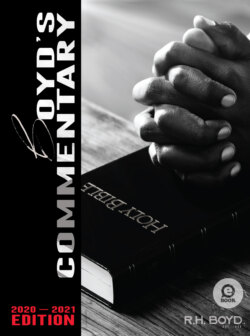Читать книгу Boyd's Commentary - R.H. Boyd Publishing Corporation - Страница 33
На сайте Литреса книга снята с продажи.
LET’S TALK ABOUT IT
ОглавлениеHow do guilt and shame frame this lesson?
Joseph’s brothers each were bound by their collective guilt and shame for the part they played in the attempt to take their younger brother’s life. Though similar emotions, guilt and shame are not the same. Guilt is the feeling that represents remorse or regret for something done. Shame is the feeling of worthlessness that one internalizes and by which they define themselves. Guilt says, “I have done something bad.” Shame says, “I am bad.” Though they are not the same, these dysfunctional conditions of the soul complement each other. When we feel guilty for the bad we’ve done and start believing we are bad because of it, we get tangled up in the endless loop of disappointment and emotional despair. Those who are bound by shame always feel guilty. Those who are guilty often will feel shame. What is the remedy to such a dramatic condition of the soul? For Joseph’s brothers, they had to face both their guilt and shame with humility, ownership, and surrender.
The ten brothers realized their predicament and were moved to face their shame (though unexpectedly) by their desperation and need of grain. From a humbled posture, they bowed before their brother, unwittingly exposing their true identity to him. Such is necessary to overcome our guilt. When we are humbled enough to expose the truth of who we really are in front of those we have offended, we are endowed with the strength of God to break free from the bonds of emotional dysfunction.
Joseph’s brothers also addressed their shame by owning their actions. Part of what distorts emotional perception is the assignment of blame. On one hand are those who take no blame whatsoever for their actions. On the other are those who unfairly take all of it. Both are wrong. Owning up to our actions means taking responsibility for what we have done to contribute to the problem and realizing the impact.
Finally, the brothers entrusted their well-being into the hands of the one who had all the power. Despite their uncertainty, the brothers had little choice but to do what Joseph said and play his game. So, they did. Overcoming our guilt and shame requires our surrender to the One who has all the power. When we bare ourselves naked in His presence, recognize our need for His grace, and trust in His ability to deliver us from our broken emotions, we are no longer haunted.
When Joseph and his brothers’ paths crossed again, they converged at a point of emotional despair by which all of them were burdened. Joseph’s despair stemmed from the lingering bitterness he still had against his family. His brothers were haunted by shame and guilt for their actions. At the point of that convergence, God exchanged their guilt and shame for grace and mercy. Grace and mercy always abound when we live according to His purpose.
HOME DAILY DEVOTIONAL READINGS
SEPTEMBER 21–27, 2020
